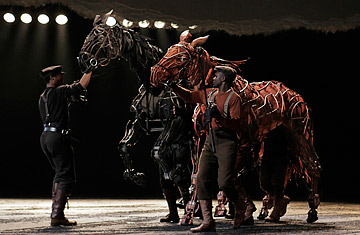
A scene from War Horse at New York City's Lincoln Center Theater on March 12, 2011
The first thing to marvel at in War Horse, the import from London that has just opened at Lincoln Center's Vivian Beaumont Theater, is, of course, the horse. He's a tall, chestnut-colored steed named Joey, embodied onstage by a life-size puppet manipulated by three fully visible puppeteers. A latticework of cane strips creates the effect of an exoskeleton, covering a leathery hide and forming a maze of gears and joints that animate the horse's legs and neck. The result is amazingly lifelike and expressive: Joey rears, snorts, nuzzles, preens; his tail slaps at flies; his chest even heaves after a heavy workout. It's all the product of South Africa's Handspring Puppet Company — whose stage menagerie here also includes birds waved around on rods by actors and a nosy goose rolled across the stage on a wheelie. Has Julie Taymor seen this show? It might remind her of the low-tech wonders she created for The Lion King but largely abandoned for the high-tech daredevilry of Spider-Man.
The next thing that may strike a seasoned theatergoer about War Horse is how full the stage is. More than 30 actors! Portraying everything from a farming community in Devon to the battlefields of France in World War I. It's the sort of epic theater that could only come from Britain, where state-supported institutions like the National Theatre (where War Horse originated) can really think big. Gathering more than five or six actors on a stage in New York City — at least for a show without stars, songs or a presold brand — is all but financially prohibitive.
But what's most astonishing about War Horse — adapted by Nick Stafford from Michael Morpurgo's 1982 young-adult novel and brought magnificently to the stage by co-directors Marianne Elliott and Tom Morris — is its sheer storytelling brio. It centers on a young Devon lad, Albert Narracott (Seth Numrich), whose father buys him a foal that Albert raises to be a hunting horse and that he then has to force to pull a farm plow; later, he loses him altogether to the army at the outbreak of World War I. The sprawling story covers a lot of ground in a tight space: there's nuanced family drama (the plot spins off a rivalry between Albert's father and uncle, the latter a Boer War hero, the former thought to be a shirker), lucid, large-scale military history, and a close-up picture of men in battle that rivals another World War I play, Journey's End, in conveying the mundane horror of the so-called Great War.
The horse tale provides a vivid illustration of the startling reinvention of warfare taking place during World War I. The British send their proud cavalry onto a battlefield where machine guns and barbed wire render them tragically useless. The equine focus also serves as the vehicle for a familiar but still powerful message about the borderless tragedy of war: Joey winds up behind enemy lines and is adopted by a sympathetic German officer, who saves him from almost certain death by putting him to work pulling ambulance carts. Not least, it's an emotional boy-meets-horse love story, as Albert, still only 16, enlists and gets himself sent to France to search for his beloved Joey. (No surprise that Steven Spielberg is turning War Horse into a movie.)
Part of the pleasure of War Horse is seeing the impossible-to-stage made plausible in the most economical and inventive ways: great battles evoked simply by a blinding flash of light, a roar of a cannon, or an interlude of slow motion or stop-action. And the cast is nearly perfect. (My highest praise is that I assumed I was seeing the British production transplanted to New York City; only later did I realize that it has been recast with American actors.) Is War Horse too sentimental? Perhaps. But there's not a moment in its compact two and a half hours when I wasn't fully engaged, moved and inspired by the theatrical imagination on display. And thrilled by a landmark theater event.
